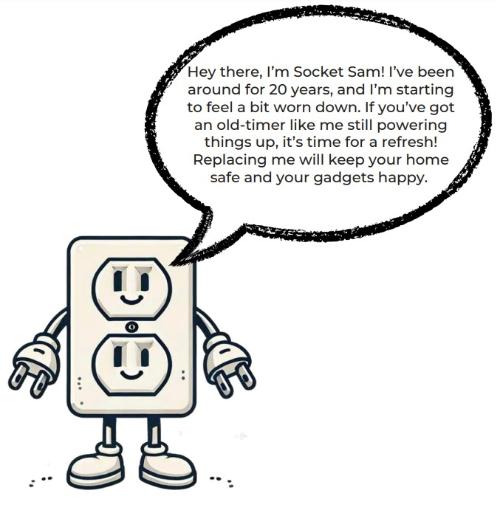
Socket Sam's Life Saving Tips & Tricks
Meet Socket Sam: Your Friendly Guide to Electrical Outlet Safety & Home Tips!
DID YOU KNOW?
- Outlets have a lifespan of 15-30 years
- GFCI outlets should be tested monthly
- Loose or worn-out outlets increase the risk of electrical fires
- If your plugs easily fall out of outlets, this is a sign they are worn
- Replacing outlets may be necessary to bring your home up to code
Socket Sam’s Tips
- Check for outlets overheating: Outlets that are warm or hot to the touch could indicate an overload or faulty wiring. This is a sign to unplug devices and contact an electrician for inspection
- Inspect Outlets Regularly Look for signs of wear, such as loose plugs or scorch marks. These can be indicators of poor connections or arcing, which can increase fire risk
- Install GFCIs Ground Fault Circuit Interrupters (GFCIs) are essential for outlets near water sources, like bathrooms, kitchens, and outdoor areas. They protect against electric shock by cutting off power when a current imbalance is detected
- Avoid Overloading Outlets Plugging too many devices into one outlet can overheat it, causing electrical fires. Make sure appliances are distributed across outlets rather than concentrated in one area
Professor Socket Sam
- AFCI Outlets: Arc Fault Circuit Interrupters (AFCIs) detect dangerous arc faults, such as when wires are damaged, and automatically cut off the power. They’re typically found in bedrooms and other areas where wiring is prone to undergo wear and tear.
- Tamper-Resistant Outlets: These outlets have built-in shutters that block foreign objects from being inserted. They’re especially useful in homes with young children, as they provide an extra layer of safety to prevent electrical shocks!
- USB Outlets: Many outlets now come with built-in USB ports for charging devices without an adapter, making them perfect for modern homes!
- Difference between 15 and 20-Amp Outlets: A 15-amp outlet is standard for many household devices, while a 20-amp outlet is often found in areas with heavier electrical loads, like kitchens or garages. The difference lies in their current-carrying capacity, with 20-amp outlets able to handle more powerintensive appliances.
When to Check Outlets
Regular outlet inspections are recommended every few months or whenever you notice any unusual signs, such as frequent tripping of circuit breakers, sparks, buzzing sounds, or burn marks around the outlet. Additionally, check outlets when moving into a new home or after a major electrical event like a power surge. For GFCI outlets, test them monthly to ensure that they’re in proper working condition.
How to Check Outlets
You can use a multimeter or outlet tester to check for proper voltage, grounding, and polarity.
Here are the basic steps:
- Voltage Check: Set the multimeter to the AC voltage setting and insert one probe into each vertical slot of the outlet. A proper outlet should read around 110–120 volts.
- Polarity Test: Confirm that the hot and neutral wires are correctly positioned. The smaller slot should be hot (black wire) and the larger one neutral (white wire).
- Ground Test: Place one probe in the ground slot and the other in the hot slot. A reading here confirms that the outlet is grounded properly.
- GFCI Test: If you have a GFCI outlet, press the test button to shut off the power temporarily, then press the reset button to restore it. This ensures that the GFCI will cut off power in the event of a ground fault.
Why to Check Outlets
Regularly inspecting outlets helps prevent hazards like electrical fires, shocks, and circuit damage. For example, outdated or improperly grounded outlets can increase the risk of electrical shock, especially in wet areas like bathrooms and kitchens. Additionally, poorly wired or ungrounded outlets can lead to equipment damage and reduced functionality for modern appliances
If Sparky is growing old in your home, let him retire and keep your home and family safe! Call One Call Electrical, Heating & Cooling Service Inc at 908-769-8200







